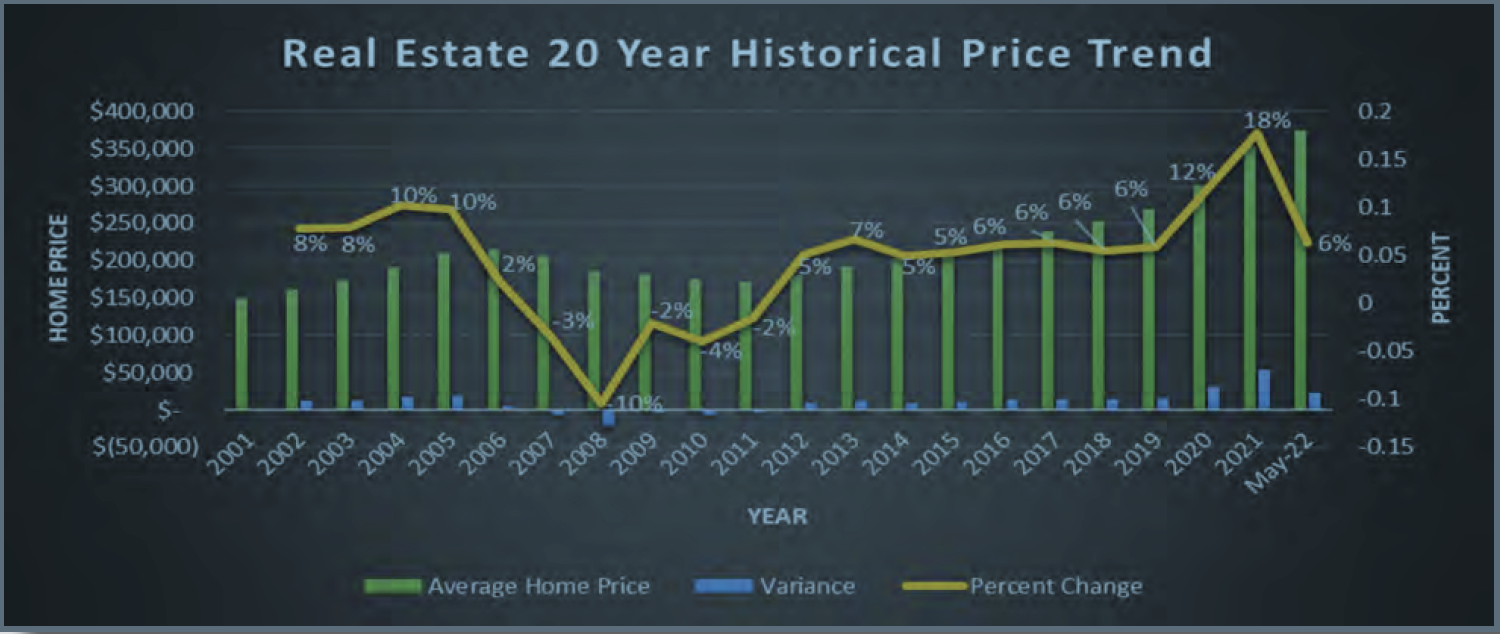I recently had a conversation with my brother-in-law about the current real estate market. He is interested in becoming a real estate broker and is uncertain about the market’s direction. To better advise those interested in real estate, I decided to research the economic factors driving the current unprecedented growth.
Looking at a 20-year price trend is illuminating. The graph shows that between 2002 and 2012, the highest annual growth in real estate prices was in 2004 and 2005, both years yielding a 10% return. However, between 2006 to 2011, the real estate market crashed, going 10% negative in 2008. It took six years to recover. Between 2012 and 2019, the market stabilized at around 6% annual growth.
Recent years show record-breaking returns. In 2020, real estate prices jumped 12%, twice that of the previous year. In 2021, growth jumped 18%. Currently, 2022’s annual growth is trending at 6%.

Interestingly, aside from the great recession years, the variance trend remained relatively stable, with a $10,000 average annual growth in prices in 2019. However, in 2020, year-over-year prices accelerated to $25,000. In 2021, average home price growth doubled to $50,000 annually. Current trends suggest that growth may reach $100,000 annually, ten times the $10,000 annual growth trend two years ago.
What are the current factors driving the Real Estate Market?
- Interest Rates: From 2012 to 2019, interest rates slowly crept up from .5 to 2 percent. According to US economy reporter Sara Foster, “The Fed Funds Rate looked like it was about to settle there until the coronavirus pandemic came along (www.bankrate.com).” From 2020 to 2022, rates have been as low as 0%. On May 4, the Fed Funds Rate target was hiked to 1%. With current inflation rates, we should expect rate hikes to continue. Will rate hikes curtail real estate market trends? My guess is, “Maybe.” How’s that for honest confidence?
- Demographics and Investors: The great recession affects the millennial generation most. They are now becoming first-time home buyers. However, they face prices that are out of reach as investment companies drive prices up. Rebecca Lake, a writer for Investopedia, wrote, “How Millennials Are Changing the Housing Market,” that investment companies are increasingly buying up and renting out starter homes. This leaves millennials struggling to buy more expensive first homes than previous generations.
- Public Policies: COVID 19 economic policies have propped up the real estate market. In addition to stimulus payments, struggling homeowners qualified for payment forgiveness, allowing them to pause payments and limiting the risk of losing their homes (www.hud.com). This artificially reduced the number of homes on the market, driving up demand and prices.
Those wanting to buy real estate should not count on a slowdown. Even if interest rates rise, millennials, investors, and public policies will still drive prices higher. Rather than thinking short-term, it’s recommended to give yourself a sustainable time horizon for real estate purchases. Work with a financial planner to help properly structure financing and cash flow to avoid a market downturn impacting your personal wealth.
If you already have an investment advisor, congratulations. However, if you’d like to learn more about what investment advisors do for their clients, please feel free to reach out to me at empirKalpartners.com for an individual assessment.
About the Author
Edward Vela is an Investment Advisor and Estate Planning Specialist at empiriKal partners, llc©, with 13 years of wealth management experience. He earned a Journalism Certification from the University of Massachusetts, a BA in Political Science, a Financial Planning Certification at UCLA, and an MBA from the UCLA Anderson School of Management. You can contact Edward at 925-300-8805 or email edward@empiriKalpartners.com.















